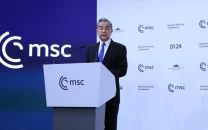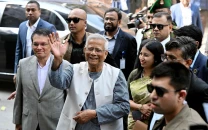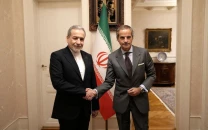The mother of democracy

Nevertheless, democracy by nature is an imperfect system, and the picture-perfect British democracy portrayed in some Pakistani press reports is far off the mark. It may be surprising to some that a significant number of people in the UK are disgruntled with the current state of democracy and dissatisfied with the two main parties, the Conservatives and Labour. Accordingly, a lot of hopes were pinned on a third party, the Liberal Democrats, who worked hard to galvanise their party and chose the charismatic Nick Clegg to lead them in the 2010 election. The media bought into the hype, especially after Mr Clegg performed very well in the television debates. However, election results failed to deliver for the Lib Dems. They won fewer seats in 2010 than they had in 2005. This can only lead one to conclude that it is very difficult, even in a well functioning democracy, to permeate the vote-banks of the established larger parties. This is not because voters are stupid or because they don’t want reform. But on election day, votes are often cast on the basis of party momentum, which helps the larger parties, or an understanding that voting for a less-known party would result in a waste of a vote and may help the candidate of the party one would least want to see in power. Hence, most voters concentrate on the bigger players.
But what the smaller parties can achieve, especially in a parliamentary democracy like Britain’s and Pakistan’s, is the role of the kingmaker. Both Labour and Conservative parties wooed the Lib Dems after election results revealed that no single party had an absolute majority and that Britain was looking at a hung parliament. This is not dissimilar to the role played by parties like the ANP, MQM or the JUI in the current Pakistani dispensation. However, what was unfathomable for many strict reformists was the fact that Lib Dems agreed to a coalition with the Conservatives. Their policies on virtually everything from foreign affairs to domestic matters are diametrically opposite. Some analysts are predicting that this uneasy coalition will not last, and just as some political pundits have been foretelling, perhaps unwisely, the imminent fall of the Zardari-led government, many in Britain predict their newlyformed coalition to be short-lived. Nevertheless, the Lib Dems seem to have accepted that in order to make any meaningful political strides, compromise is essential.
Finally, a point about the role money plays in politics. Much has been written in Pakistan about the astronomical rise of Baroness Sayeeda Warsi whose father was an immigrant mill worker. But what these reports fail to say is that though Ms Warsi’s father may have started off as a mill worker, today he is a factory owner and has reported income in excess of £2 million a year. Ms Warsi, moreover is David Cameron’s appointment and did not contest an election after having lost to Labour candidate Shahid Malik in her home constituency, Dewsbury, in the 2005 election. Dewsbury has a significant Muslim population who view Labour as more immigrant friendly, and has thus been a Labour party stronghold, but this year Mr Malik lost to Conservative candidate Simon Reevell, perhaps in part due to Mr Malik’s alleged involvement in the expenses scandal.
The Conservative party victory in the 2010 election may be attributed to a yearning for change with Labour having been in government since 1997, dislike for Gordon Brown and also “Ashcroft money”. According to the British press, Lord Ashcroft, a billionaire Tory peer, pumped in large amounts of money to help the Conservatives to victory. In exchange, he would of course expect to maintain his favourable but controversial nondomicile tax status.
Published in the Express Tribune, May 23rd, 2010.


















COMMENTS
Comments are moderated and generally will be posted if they are on-topic and not abusive.
For more information, please see our Comments FAQ